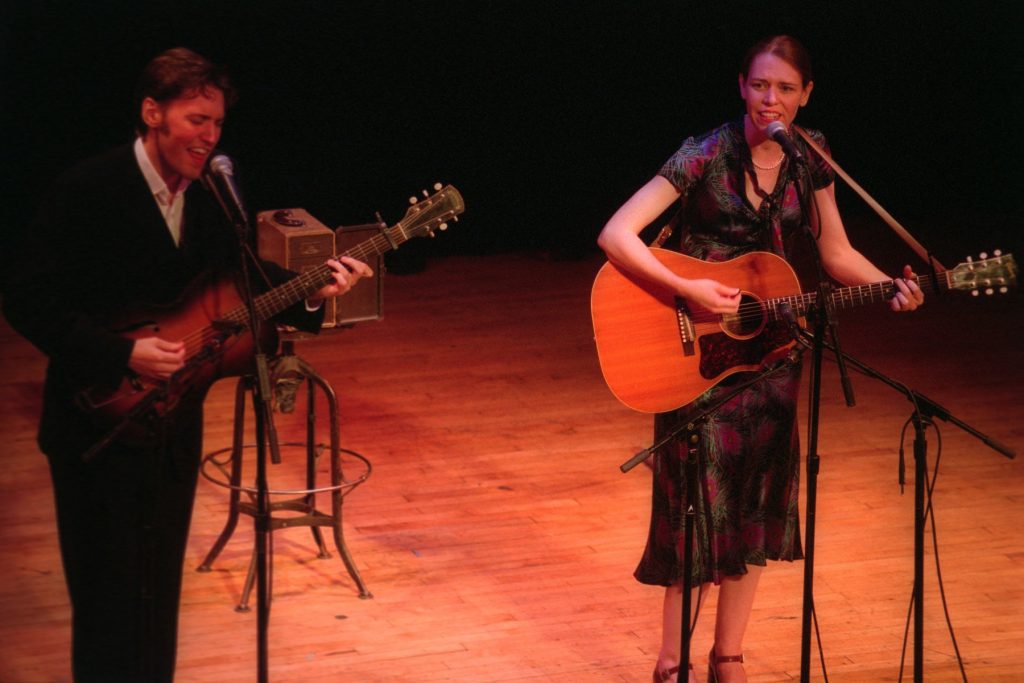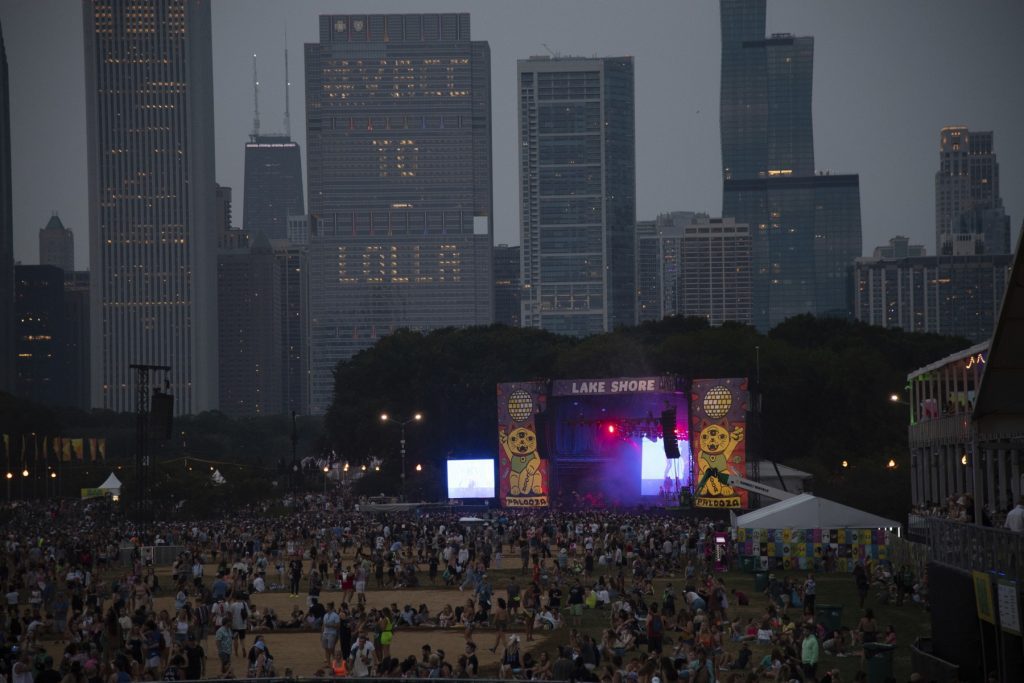
Gillian Welch, David Rawlings Talk 20 Years Since Landmark Album ‘Time (The Revelator)’
“Honest to god,” says Dave Rawlings, “we could talk about this album for a week.”
Rawlings and Gillian Welch would be the first to admit that it’s difficult to discuss their landmark third album Time (The Revelator) without launching into a thousand tangents. Every one of its 10 songs, every raw emotion the duo channeled into the record, every one of their failed attempts to record the album — each of these could be the subject of its own lengthy interview. Each backstory has its own backstory, its wheel inside a wheel.
Here are the basics: The songs were mostly written over the course of 1999 and 2000, in the midst of the collaborators’ terrifying decision to start their own label. After two efforts to record the album in Los Angeles fell apart — first, with T Bone Burnett, then, a brief two-week stint at Jon Brion’s studio — the pair returned home to Nashville, disheveled and disappointed. Sometime later, Rawlings drove around town looking for a studio, as he tells the story, and stumbled upon RCA’s Studio B. The door happened to be open and Rawlings walked in.
blogherads.adq.push(function () {
blogherads
.defineSlot( ‘medrec’, ‘gpt-dsk-tab-country-article-inbody1-uid0’ )
.setTargeting( ‘pos’, [“mid-article”,”mid”,”in-article1″,”btf”] )
.setSubAdUnitPath(“music//country//article//inbody1”)
.addSize([[300,250],[620,350],[2,2],[3,3],[2,4],[4,2]])
;
});
“I heard the sound my feet were making and I thought, ‘Oh my, this is one of the most beautiful sounding spaces I’ve ever heard,’” he says. Welch and Rawlings eventually secured the historic studio space, and there they finally recorded and produced the album with help only from engineer Matt Andrews.
For her part, Welch calls the record “pre-apocalyptic.” She’s thinking back to the time it was created: the sense of helplessness her and Rawlings were feeling as artists with their souls at stake, navigating a cataclysmically shifting music industry (Napster, which Welch sings about on “Everything Is Free,” had just been introduced). She’s also thinking about the subsequent two decades of aggressive development that forever reshaped the late Nineties ghost town that was Nashville.
Twenty years later, Time (The Revelator) stands apart in the duo’s work as their album with the most enduring afterlife, the record that channeled their inner-most thoughts, fears, and anxieties, and as the purest distillation of the miniature-turned-major sound that arises when the two perform as a duo. “It is a particular kind of high-water mark,” Rawlings says of the album. “It stands, in a lot of ways, as my favorite piece.”
Robert Plant put it even better: After it was released, he told the Welch and Rawlings that Time (The Revelator) was “a masterpiece of the infinite.”
Welch’s third album has lived its own second, third, and fourth lives in the ensuing 20 years. “Everything Is Free” has become a modern standard in the age of streaming alienation; “April the 14th Part 1” has turned into its own dark historical holiday among the duo’s devoted following; “Red Clay Halo” serves as the name for Australian singer-songwriter Emily Barker’s backing band; and “Elvis Presley Blues” has been covered by everyone from Joan Baez to Jimmy Buffett to Grace Potter to Tom Jones.
To get a sense of the profoundly personal impact the album has had on its coalition of megafans over the past two decades, one needs only skim the YouTube comments for the album’s closing masterpiece, “I Dream a Highway.”
The heartbreaking ballad exists in a private universe of its own. It is not and will not ever be recommended by any streaming algorithm. Welch and Rawlings have only played it live a handful of times since it was released. And yet, it has transformed legions of fans.
blogherads.adq.push(function () {
blogherads
.defineSlot( ‘medrec’, ‘gpt-dsk-tab-country-article-inbody2-uid1’ )
.setTargeting( ‘pos’, [“mid-article”,”mid”,”in-article2″,”btf”] )
.setSubAdUnitPath(“music//country//article//inbody2”)
.addSize([[300,250],[300,251],[620,350],[2,4],[4,2]])
.setLazyLoadMultiplier(2)
;
});
“My now husband sent this to me years ago when he was in Afghanistan. I listened to it until I believed him…We dream a highway back to each other always,” reads one comment. “Vivid memory listening to this song with my love in a beach carpark in Galicia Spain in 2008 on a dark winters night both knowing we wouldn’t last despite our love,” reads another. One more: “This song hurts so much. Life hurts so much.”
It’s been a long time since the tumultuous period that produced their defining masterpiece. The wounds and scars have mostly healed, but both Welch and Rawlings can easily recall each and every one with a new sense of clarity and perspective. Time, after all, as the two still sing on stage, is a revelator.
This interview has been condensed and edited from two separate conversations with Welch and Rawlings.
Where does your mind first go when you think back to making this album?
Rawlings: Robyn Hitchcock said something to us one time. We made a record with him, and he said something about how what we did was like a child’s drawing of a recording session. Everything in our career, and in our music, happened in miniature. Our band is very small, and the music we make is very quiet. If you come to a show of ours, we’re making these very quiet sounds on stage, but they’re coming out of the speakers very loud. Once you go inside the looking glass and enter the diorama, then everything is full-sized.
There was a moment where a song we had worked on for a long time [“April the 14th Part 1”] was failing in most ways but there was something very interesting in the concept behind it. It was not working in one form, and then we tried it in another form, and there were other forms in between. There was a point where lyrics from that had been spilled over into “I Dream a Highway,” and there was a moment where I thought, “OK, this is going to be our little concept record. This is going to be our Tommy.” I thought we could pull something off like that because of the way the themes, and in some cases the words, in one song were activating things in other songs. I was excited about that. It’s funny to think that in the end, in a way, we pulled that off.
blogherads.adq.push(function () {
blogherads
.defineSlot( ‘medrec’, ‘gpt-dsk-tab-country-article-inbodyX-uid2’ )
.setTargeting( ‘pos’, [“mid-article”,”mid-articleX”,”mid”,”in-articleX”,”btf”] )
.setSubAdUnitPath(“music//country//article//inbodyX”)
.addSize([[300,250],[300,251],[3,3],[620,350]])
.setLazyLoadMultiplier(2)
;
});
Gillian, you wrote “Everything Is Free” in the tiny office you called “The Cubby” in your home in Nashville’s Sylvan Park. Is that where many of these songs were written?
Welch: They are. I’m sure that “Everything Is Free” and “Revelator” were. There was also a moment during the writing process where Dave suggested to me that defeat wasn’t an option, so there was a point where any time I walked into the Cubby, I was to come out with a song, and basically wasn’t to come out without a song. “Dear Someone” was one of those. Honestly, I was really tired, and I wanted to go to bed, but I didn’t have a song, so I thought, “OK, something sing-song, almost a nursery rhyme, almost a lullaby.” That was “Dear Someone.”
When did the writing for this record start?
Rawlings: There was a moment [after buying their own recording equipment] when I said, “OK, now if we get dropped, we can keep making records.” Two weeks later we heard that our label Almo Sounds was going to be sold to Interscope. We knew that was going to be not a good home for us. We had written “Revelator” and “April 14th” and some other songs. A lot of these songs felt a world away from the songs we had written for Hell Among the Yearlings. They felt, again, because we’re living in this world of miniature, further away than they actually are. But to us, it felt like a massive departure. And we thought, “We can’t play this stuff acoustic, it needs to have a backbeat. There needs to be drums.”
So, I think, in ‘99, we were playing these songs in every possible configuration. We were working with our friend David Steele, and he was playing electric bass. Gill was playing electric guitar, and she’s incredibly dexterous, and a good drummer, so she would be playing the drums with her feet and with a brush in her hand and then also able to play electric rhythm guitar at the same time. I have recordings of this stuff. It’s really interesting. It’s sort of closer to something like Bauhaus, or slowed-down Depeche Mode, than you’d think. As soon as you take those songs and divorce them from the acoustic stuff, it gets fairly heavy-sounding fairly fast.
Gillian, in 2019, you said, “We felt really threatened on that whole record.” When you think about the album today, is that sense of feeling threatened one of the first things that hits you?
Welch: It’s a major theme of the record. I don’t think of it as “threat” so much as peril. We felt like our ability to be artists, like, for our career, was really in jeopardy. I felt really raw and alone. There was a strong feeling that it was just Dave and I against the world. [We] just felt impossibly alienated and disconnected. People talk so much about post-apocalyptic art. In a weird way, I think Revelator is pre-apocalyptic art. We had already felt the tremor and saw the foundation washing away. We saw it coming. It’s like when there’s a tsunami coming, and you just see the water going out, out, out. That’s what this time period was. We just saw the water going out, out, out. The whole infrastructure of the music world was teetering and toppling, and we see what that’s begotten today.
blogherads.adq.push(function () {
blogherads
.defineSlot( ‘medrec’, ‘gpt-dsk-tab-country-article-inbodyX-uid3’ )
.setTargeting( ‘pos’, [“mid-article”,”mid-articleX”,”mid”,”in-articleX”,”btf”] )
.setSubAdUnitPath(“music//country//article//inbodyX”)
.addSize([[300,250],[300,251],[3,3],[620,350]])
.setLazyLoadMultiplier(2)
;
});
You and Dave have spoken a great deal about the erasure of Nashville’s history, and the way that the city has changed, when talking about this time period.
Welch: It was so much more of a ghost town, literally and figuratively. There were still so many undercurrents of old Nashville. A lot of those actual residences in this town have been obliterated. We used to walk around the streets at midnight. There was just nothing to do. I guess we could’ve been in a bar, but that just wasn’t our way. That would’ve been too noisy. So we just walked around these empty streets and we never saw people. There were very few lights on. Every now and then you’d see the flickering blue light of a television. It was a good environment to think your thoughts. Very little intruded. But it didn’t really feel secure. We weren’t financially secure. It didn’t feel like my ability to put out records was secure. My relationship with my manager wasn’t secure. Everything was sort of, like I said, washing away.
Did you have a sense of what that would sound like, when you knew you wanted to make it yourself?
Welch: That was the job: how do we get these songs across with just the two of us. It’s always taken some doing. RCA B was a wonderful fit. It’s an extraordinary room, with beautiful, beautiful clarity to its overtones. It helped us make these miniature panoramas. There’s a great feeling of landscape on this record, which is funny, because I had been to school as a photographer, and what I am is a landscape photographer. I think I definitely appreciate the horizon line. There’s a real sense of panorama, and something very wintery, something just a little bit brittle about this record. It’s not a lush, fruitful record. It’s kind of like making Christmas dinner with what you have left.
The leaves are not on the trees on this record.
Welch: The leaves are not on the trees.
blogherads.adq.push(function () {
blogherads
.defineSlot( ‘medrec’, ‘gpt-dsk-tab-country-article-inbodyX-uid4’ )
.setTargeting( ‘pos’, [“mid-article”,”mid-articleX”,”mid”,”in-articleX”,”btf”] )
.setSubAdUnitPath(“music//country//article//inbodyX”)
.addSize([[300,250],[300,251],[3,3],[620,350]])
.setLazyLoadMultiplier(2)
;
});
Do you remember how “I Dream a Highway” began?
Rawlings: It’s very complicated, the writing of that song. We could talk about it for an hour. It starts with a lick, a little melody that I play on the guitar that Gill hears me play and remembers and writes the chorus for, but it’s an up-tempo song at that point in a major key. The chorus is really beautiful, but we can’t do anything with the song. It’s just too sing-song or something. And then, when everything is just absolute shit, I remember going into the back room at the old place we were living in, and I just played the minor chords and sang a little bit of that melody and thought, “Man, that is the most depressing thing I’ve ever heard in my life.” It’s one of those moments that’s so clear to me, still.
And Gillian, because of plenty of personal things, had done all this very intense, caffeine-fueled free-writing that was laying around. I just started piling it all into this one song. I’d try to write a verse, grab a line from here, grab a line from there, and just sat there for hours until I had all these pages of this song. Because the song was so long and so weird, I had it in my head that I didn’t want [Gillian] to sing it, ever, until we recorded it.
What do you remember about the reception to the album once it was released?
Welch: We were more defined as artists, and consequently, as people, though that’s its own trouble. I had put more thoughts from the deeper cortex of my mind into this record than any other. Dave had done the same. We had both really given our deeper selves for this, which partly happened because we were so — I don’t know how else to say it — raw. We were seeing the world in such a peculiar way and seeing the connections from history to now, and everything was combining, all these threads seem to connect everything, which was why “I Dream a Highway” was so important, because it was the one song that did what we were feeling most, if that makes sense. It’s a little bit hard to talk about, right? This is one of the beautiful things about art, this is why art is so important: Some things are hard to talk about.




